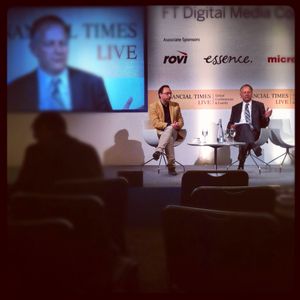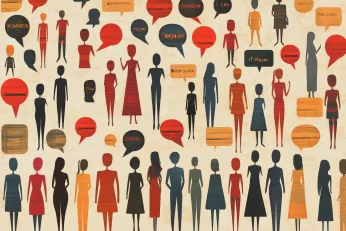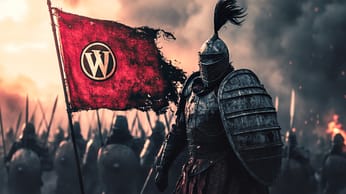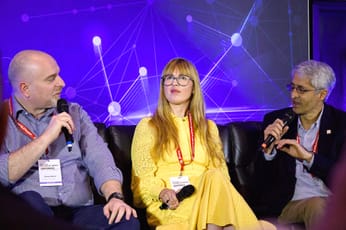
#ftmedia12 - Wikipedia and harnessing the power of social media
Wikipedia is becoming increasingly important to our information landscape - but how reliable is it, and how well-balanced are its contributors?
Opening Remarks – Rob Grimshaw, managing director of FT.com
Rob Grimshaw kicked off by making a rather disparaging comment about digital being for the whole company (which I agree with) rather than “100 geeks in the corner” (which is a pretty shoddy way of describing the digital pioneers in publishing business)…
How to take traditional businesses and their successful models and translate them into digital models, he asks. And he admits that it might involve working in very, very different ways.
Harnessing the power of social media – Jimmy Wales, Wikipedia
Jimmy Wales first met Tim Bradshaw at one of these events – and coughed red wine all over him…
Wikipedia was based on the idea of giving every human being on the planet free access to the sum of all human knowledge. Wales asks how many of the audience have edited Wikipedia – I’d estimate about 10% based on the show of hands, and he thought that was low for a digital conference. Wikipedia isn’t just free for use, it’s free for reuse, too. That’s been an important element of its growth – the only requirement is attribution, which generally means a link back. And those links are a huge factor in its seach ranking and its traffic.

Wikipedia is very specifically an encyclopedia. Lots of people think that “harnessing the power of social media” is writing an advert for your company within Wikipedia – and that ends in tears, because it gets deleted by Wikipedians. The content isn’t evenly distributed by language, though, with English and European languages dominating. Content creation is roughly balanced in subject type across cultures, but content consumption varies wildly. The Japanese read more pop culture than any other nation. The Germans are the most interested in geography. Nick Clegg’s entry is only really read in the UK – the rest of the world isn’t interested in the UK’s deputy prime minister.
Who writes Wikipedia? For the next generation coming up, Wikipedia is just part of the infrastructure of the internet. They see encyclopedias in the light of Wikipedia, not the other way around. The creation community is 87% male right now – Wales is not happy about that, and want to address it. He suggests that the off-putting nature of wiki mark-up is part of that. It means that there are a disproportionate number of IT and tech workers editing the site. The average age of a contributor is about 26. And there’s double the percentage of PhDs as compared to the rest of the population.
Wikimedia Foundation – which runs Wikipedia – is a charity, and has around 100 employees. There are 100,000 volunteers. That “annoying” campaign – his words – when his face appears on every Wikipedia page asking for money is successful in raising the money they need to run. Wikia is their home for things that don’t fit in an encylopedia. For example: Lostpedia – for the TV show Lost. The contributors to Lostpedia noticed that every time someone in the show mentioned Canada, they were lying. The show’s writers hadn’t intended that, but they took note of it and adopted it…
Question from interviewer Richard Waters: a lot of people in this room are tired of giving things away for free. Why haven’t anti-piracy measures worked?
Wales: To characterise SOPA as Silicon Valley versus business is wrong, it was the internet community that rose up against it. For paid media businesses, Wales thinks the rise of the app store models is interesting. Angry Birds is successful partly because it’s so easy to impulse purchase the game. If I have to go online and get out my credit card to pay for content, that’s a big barrier. Apps are so easy to buy that people do more of it. The way people pay for content has to make sense to them. People would be happy to pay for content they can’t get yet – like someone in India wanting to buy the BBC’s Sherlock. It’s game over for the industry’s staggered worldwide release model. He thinks there are things that can be done about piracy, but we can’t afford to be clumsy and bumbling about it. We can’t afford legislation that closes Wikipedia because one person uploads a copyrighted image. Megauploads was shut down – if we believe what was in the indictment their internal conversations were all about how to break the law – and the law is bringing them down. That’s the right approach.
We’ll always have teenagers finding ways of copying things – remember the cassette tape. You can still go after the large scale pirates where money is changing hands. The law needs to support the way people use media. Why should someone go to jail for sharing a track that they think their sister will love – and which might lead to her buying the album?
Wales is adamant about not using Wikipedia for general campaigning. The decision to black out Wikipedia in protest against SOPA was made by a community vote, not dictated from the “top”.
The audience of Wikipedia is a digital republic – 500m users a month. They’re seeing a shift towards more traffic from social meda – but he doesn’t know the exact figure. Anything huge and in the news sees parallel spikes from social media and search – routine topics are much more from search. Lots of funny, quirky articles get linked from social media. They care a lot about people’s privacy, so they don’t share server logs. They’re unlikely to add Facebook Like buttons for similar reasons. Editing Wikipedia should be a public action, reading it a private one, so no frictionless sharing.

How do they feel about the “closed” world of iOS? He’s concerned. He’s not seeing a big push against net neutrality – but while people get uptight about that, there’s been this whole change where our devices get locked down. But he thinks the open web channel from Safari will stay – the issues are around software development.
The managing director of Encyclopedia Britannica UK is here and has a question (it’s looking like a prepared statement): he points out that Britannica comes higher in brand surveys in the UK than Wikipedia – and he gets asked to turn it into a question. He eventually asks why they went for a charity rather than a commercial model? Wales points out that it’s inherent in the model – it’s built on volunteers, from the writers and editors, to the advocates go out and publicise it. And he doesn’t want to be known as the man who killed the Britannica. No danger of that, quips the questioner.
What are they doing to encourage women to edit? He mentioned a simplification of the interface, and they’re also doing outreach work, to get new people to consider editing. And they’re also looking at the way the community works. When you have 87% geek men, you have certain personalities and behaviours you have to watch out for, because they drive away women and some men.
He hasn’t read Google’s new privacy poilcy – he’s amazed at the effort they’ve made to get him to read it, but he doesn’t care. He always assumed they’d combined information and was surprised that they didn’t. He was waiting to see if the internet got mad about it, and if they did, he would go and look. Wikipedia gathers some basic data, about most read articles, and the like. But they don’t personalise. Probably they should (he says) but they don’t.
Is he worried that making editing Wikipedia easier will affect the demographic? He’s hoping it will. They’re not worried about lots of dumb people trying to edit Wikipedia – that already happens. They’re worried about all the clever people who can’t be bothered learning Wikipedia markup.
Sign up for e-mail updates
Join the newsletter to receive the latest posts in your inbox.










Anyone know of any big stories happening today? Paid Members Public
There's got to be something. Maybe an election somewhere?